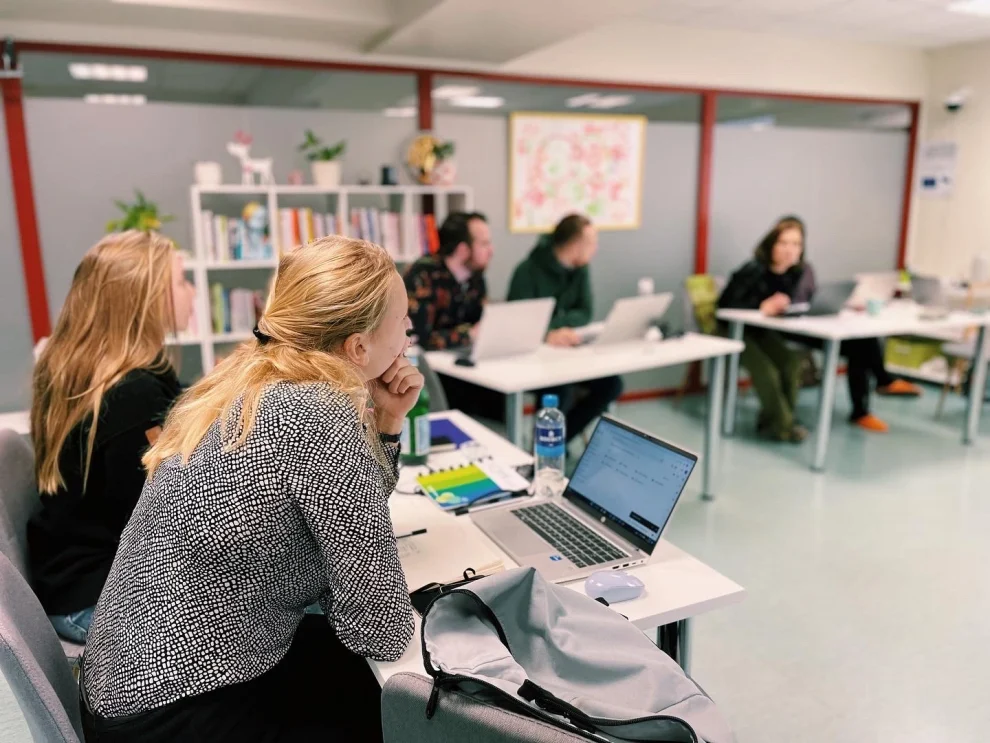International partnerships
Participating in European consortia increases the impact of your work. Discover our role as a design partner in international collaborations.

In collaboration with educational partners from Romania, Cyprus, Estonia, and the Netherlands, 8D is working on the “Growth Game” – an innovative way to promote the growth mindset among primary school students. The game, inspired by the theory of renowned psychologist Carol Dweck, is expected to be launched in the spring of 2024. Teachers will be able to use these materials for free.
“A crucial element of the growth mindset is the belief that talent and intelligence are not fixed traits but qualities that can be developed through dedication, effort, and an open attitude toward learning. This positive perspective has proven benefits for academic performance. When students, especially children and adolescents, believe they can grow and develop their skills, they are more motivated to do their best and experience less fear of failure,” explains Giel Hekkert, initiator and project leader of the consortium at 8D.
A PISA study from 2018 revealed that only 63% of European students had a growth mindset at that time. “This means that many students still think their intelligence and skills are unchangeable, which is referred to as a fixed mindset,” says Hekkert. “Furthermore, not everyone is familiar with the theory behind the growth mindset, leading to inconsistent application of its principles. Our partnership aims to change this.”
The European partnership began in 2021 with a comprehensive inventory of existing growth mindset interventions in primary education in all participating countries. Which methods are effective, and which are not? Additionally, the partnership explored the current level of familiarity among teachers with the theory behind the growth mindset. The findings of this research form the basis for the curriculum and the creative intervention that the partnership is currently developing.
“Within the partnership, 8D is responsible for the creative concept of the game and the technical implementation of the whole project. Based on the research, we proposed three concepts to the partnership and the involved teachers: a fully analog game, a hybrid form, and a strongly scenario-oriented digital game,” says Hekkert. “What matters to us is that the implementation of the materials is as accessible as possible, and that teachers endorse the chosen format. This also means that, despite the name suggesting otherwise, a serious game doesn’t always have to be entirely digital. In this case, we opted for a hybrid format: growth mindset challenges carried out in the classroom, but accessible and customizable through a web-based generator, making it easy for teachers to put together a suitable and effective lesson package.”
Read more about: Partnerschips, Working together for education and well-being
The development of the creative challenges is a collaborative effort within the partnership, with various educational institutions represented. Hekkert notes, “This ensures that we are confident the assignments are sufficiently diverse, have a solid didactic foundation, and can be applied in various European educational contexts. The growth mindset is something that helps students throughout Europe in their development – it’s a mindset that people benefit from throughout their lives. That’s why we chose to approach this project on an international scale.” To assist teachers in effectively implementing the Growth Game in their classrooms, the partnership is developing a user guide and an evaluation method. This evaluation method helps teachers monitor to what extent the students’ attitude toward learning has positively changed through the growth mindset challenges. Hekkert adds, “With these additional resources, teachers will be able to maximize the benefits of the game and the associated curriculum.”
The developed technology for the Growth Game provides a basis for further development. “The system we’ve built is well-suited for the adaptive delivery of various teaching materials, even on different subjects. We will certainly explore how the framework developed within this project can be useful for other educational objectives – especially within a European context, as we have already considered multilingualism. We are always open to new collaborations in this area.” The Growth Game and its accompanying materials will be freely available at www.growthgame.eu. For more information or to discuss potential collaborations, please contact us at info@8d-games.nl.
This project is co-funded by the European Union under the Erasmus+ Partnerships program.
